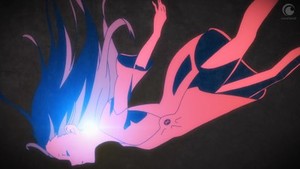Kiznaiver
Episode 9
by Nick Creamer,
How would you rate episode 9 of
Kiznaiver ?
Community score: 4.4
 Kiznaiver's ninth episode was a culmination of all that has come before, a capstone and breaking point that represents the series in full. In terms of both its craft and actual narrative mechanics, it embodied the fundamental conceit of Kiznaiver - coldly artificial devices opening the door to something bracing and emotionally real. It was a simultaneously breathtaking and frustrating episode, demonstrating the show at its best while also gesturing towards the further heights it can never quite reach.
Kiznaiver's ninth episode was a culmination of all that has come before, a capstone and breaking point that represents the series in full. In terms of both its craft and actual narrative mechanics, it embodied the fundamental conceit of Kiznaiver - coldly artificial devices opening the door to something bracing and emotionally real. It was a simultaneously breathtaking and frustrating episode, demonstrating the show at its best while also gesturing towards the further heights it can never quite reach.
The shot framing deserved particular notice, as it always does. From the first shot of Chidori standing isolated by the door (a symbolic passing of the torch from Sonozaki's framing in the previous episode), characters were alternately captured in distant loneliness or uncomfortably intimate closeup, as the feelings they'd guarded became visible in the ugliest ways possible. The first of the episode's two setpiece scenes, where Katsuhira and Sonozaki finally connected over their past in the school gym, was a particular highlight. There was a strange sense of alienation to the way the two were separated in space, appropriate for their awkwardly clinical bond. And as Sonozaki detailed their past, the shots shifted, Katsuhira's feelings expressed through closeup before the two were brought together.
The flashback to the original Kizna program demonstrated another of Kiznaiver's core strengths, its phenomenal sound design. The lulling refrain of Sonozaki bouncing the basketball acted as a kind of metronome, while the mechanical action felt like a way of distancing herself from her words, like fiddling with your hands as you tell someone a secret. That dribbling transitioned gracefully into the bubbling voices of the children, and the actual musical choices once again lifted the underlying material. Kiznaiver is almost always a cohesive, impressive aesthetic production.
Other shots seemed design to emphasize just how iconic and therefore artificial some of these emotional moments felt. “Iconic” is the precisely right word for it - moments like the camera framing Chidori's sneaker slapping through the puddles, or the dramatic pullback to Katsuhira embracing her, emphasize the accepted iconography of adolescent drama, and in doing so underline how so many of these cathartic moments aren't actually real. They're play-acting - provoked by malevolent overseers into spilling their guts, these characters act out the broad beats of confession and catharsis, doing what they think they're supposed to do, or what they assume everyone else expects of them.
At times, this exuberant artifice feels less intentional than simply hackneyed. The one-two punch of “go after her” felt like a fake beat, and one the show has already leaned on in the past. The scenes between the teacher and counselor never feel more than genre dressing, and characters like Nico and Yuta deserve more than they're given. The richness of the show's strengths only increase the disappointment of these failings; there is a legitimate classic here, but too much is lazy, too much is underwritten or assumed.
But when it works, it works. There are awkward, intimate gems even in the script: Sonozaki's graceless and wholly characteristic “how much do you think about me throughout the day,” a believable and endearingly insecure question. Tenga's “what do I do when I catch her,” and Chidori's heart flipping from its bitter desires to “how can you hold me? You're so cruel.” The raw ugliness of that confession-tumble altogether, as characters admitted to feelings as sad and human as “if you don't want Tenga-kun, give him to me.” And the overwhelmingly beautiful execution, turning lonely kids into epic theater.
“Good enough to make me sad I can't expect more” seems more insult than complement, but Kiznaiver is just short of something sublime. All the pieces are there; if the show simply gave its secondary leads a little more texture, and lightened its genre device density by a few notches, I'd have no complaints. It's already gorgeous and claustrophobically intimate. It's just short of the stars.
Overall: A-
Kiznaiver is currently streaming on Crunchyroll.
Nick writes about anime, storytelling, and the meaning of life at Wrong Every Time.
The views and opinions expressed in this article are solely those of the author(s) and do not necessarily represent the views of Anime News Network, its employees, owners, or sponsors.
discuss this in the forum (106 posts) |
this article has been modified since it was originally posted; see change history
back to Kiznaiver
Episode Review homepage / archives